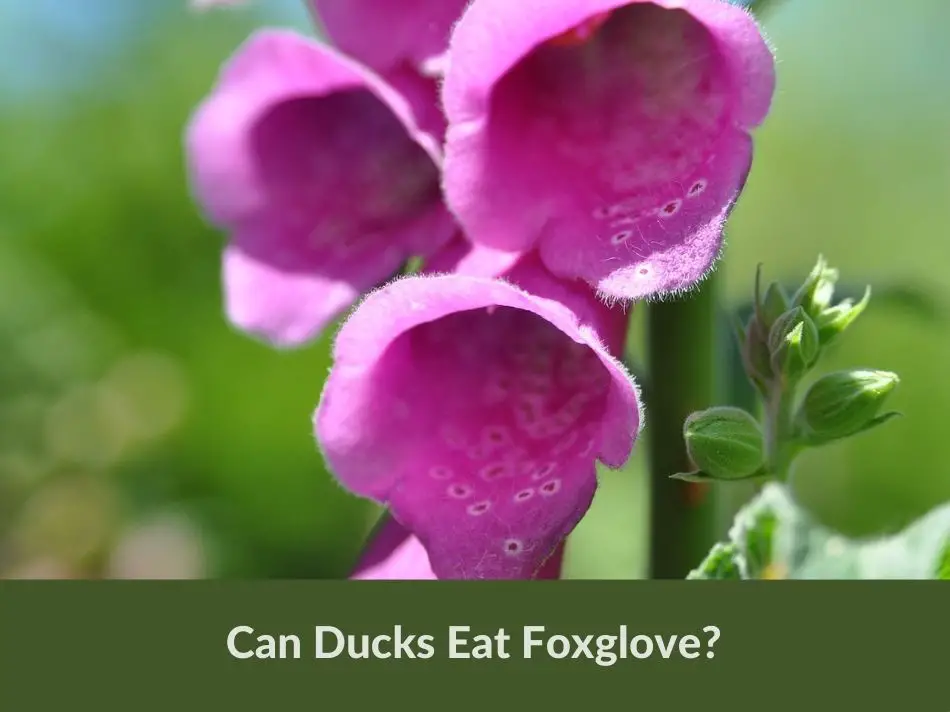Ducks, with their voracious appetites, consume a wide range of foods depending on their habitat. In the wild, their diet primarily consists of aquatic plants, small fish, insects, and even crustaceans. When near human habitation, ducks are known to eat grains, grass, and occasionally, foods offered by humans. But, can ducks eat foxglove?
No, ducks should not eat foxglove. Foxglove contains compounds called cardiac glycosides, which can be toxic when ingested. Ingestion can lead to adverse health effects, including digestive upset, irregular heart rhythms, and in severe cases, death.
In this article, readers will gain insights into the dietary preferences of ducks and whether foxglove is a suitable food option for them. We’ll discuss the usual food sources for ducks, the potential effects of foxglove on these birds, and considerations for those who care for ducks or encounter them in public spaces.
What Is Foxglove?
Foxglove, scientifically known as Digitalis purpurea, is a perennial plant that’s native to Europe. It has since been introduced to various parts of the world due to its visual appeal and medicinal properties. Characterized by its tall spikes adorned with tubular, bell-shaped flowers, foxglove can grow up to 5 feet in height. The flowers can vary in color, most commonly found in shades of purple, but also in pink, white, and yellow.
In the wild, foxglove tends to thrive in woodland clearings, moorlands, and along roadsides. Its preference for slightly acidic soils allows it to flourish in such settings. While its blooms are a delight to the eye, it’s essential to remember that the entire plant, from its roots to its flowers, is toxic.
Apart from its natural beauty, foxglove has been of interest to herbalists and the medical community for centuries. Its extracts have been utilized for various ailments, leading to the discovery of its cardiac glycosides, which are used in modern medicine to treat heart conditions.
Despite its medicinal value to humans, its inherent toxicity means that it poses risks to various animals, including ducks, if consumed. As with many plants, it serves as a reminder of nature’s duality, offering both benefits and potential dangers.
Chemical Constituents Of Foxglove
Foxglove is chiefly known for containing cardiac glycosides, specifically digitoxin and digoxin. These compounds play a pivotal role in the treatment of heart conditions in humans.
Digitoxin and digoxin, while therapeutic in prescribed doses for specific ailments, can be toxic when consumed inappropriately.
Toxicity In Birds
Birds, like ducks, have physiological systems that might react differently to certain toxins than mammals. The cardiac glycosides present in foxglove can lead to symptoms of poisoning in ducks, including:
- Labored breathing
- Cardiac arrhythmias
- Weakness
- Gastrointestinal upset
- Potential fatality
It’s worth noting that the entire foxglove plant – from its leaves, flowers, to its seeds – contains these toxic compounds, making any part of it potentially harmful to ducks.
Behavior Of Ducks Towards Foxglove
While ducks are typically foragers and might consume a wide array of plants, they often have an inherent sense of which plants might be harmful. It’s uncommon for ducks to willingly consume large quantities of toxic plants.
That being said, accidental ingestion can occur, especially if they are exploring new environments or if food sources are limited.
Preventative Measures
For those who maintain duck ponds or raise ducks in gardens where foxglove grows, there are steps that can be taken to minimize risks:
- Separation: One of the most effective ways to prevent ingestion is by physically separating the ducks from areas where foxglove is present. This could involve fencing off the garden or relocating the foxglove plants to areas inaccessible to the ducks.
- Education: Make sure that everyone involved in the care of the ducks is knowledgeable about the plants in the vicinity and can recognize foxglove. By being informed, caretakers can quickly react if they suspect a duck might have ingested any part of the plant.
- Monitor Diet: Providing ducks with a well-balanced and diverse diet can decrease the likelihood of them seeking out other plants, potentially toxic ones, to fulfill their nutritional needs.
Other Flowers Ducks Can Eat
When considering a diverse and enriching diet for ducks, many garden flowers prove to be not only safe but also nutritious for these avian creatures. Flowers like lilacs, petunias, and marigolds can serve as delightful treats that diversify their diet, enrich their foraging experience, and provide essential nutrients.
Here are some other flowers that ducks can consume:
Make sure to see our thorough list of plants and flowers ducks can enjoy.
Conclusion
Foxglove, while beneficial for certain medical treatments in humans, poses a real threat to ducks due to its toxic cardiac glycosides. It’s essential for duck owners and caretakers to be aware of this risk and take measures to prevent potential ingestion.
By being proactive, it’s possible to enjoy the beauty of the foxglove plant while safeguarding the well-being of our feathered friends.
Disclaimer: The information in this article is for informational purposes only. I'm not an expert or a veterinarian.


